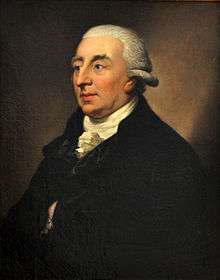Johann Christoph Adelung
| Johann Christoph Adelung | |
|---|---|
 Johann Christoph Adelung, in a portrait by Anton Graff | |
| Born |
8 August 1732 Spantekow |
| Died |
10 September 1806 (aged 74) Dresden |
| Nationality | German |
Main interests | Philology |
|
Influences
| |
|
Influenced
| |
Johann Christoph Adelung (8 August 1732 – 10 September 1806) was a German grammarian and philologist.
Biography
He was born at Spantekow, in Western Pomerania, and educated at schools in Anklam and Berge Monastery, Magdeburg, and the University of Halle. In 1759 he was appointed professor at the gymnasium of Erfurt, but relinquished this situation two years later and went to reside in a private capacity at Leipzig, where he devoted himself to philological researches. In 1787 he received the appointment of principal librarian to the Elector of Saxony at Dresden, where he continued to reside until his death in 1806.[3]
Work
The writings of Adelung are voluminous. By means of his excellent grammars, dictionary, and various works on German style, he contributed greatly towards rectifying the orthography, refining the idiom, and fixing the standard of his native tongue. His German dictionary Grammatisch-kritisches Wörterbuch der hochdeutschen Mundart (1774–1786) bears witness to the patient spirit of investigation which Adelung possessed in so remarkable a degree, and to his intimate knowledge of the history of the different dialects on which modern German is based.[3]
No man before Jakob Grimm did so much for German. Shortly before his death, he issued Mithridates, oder allgemeine Sprachenkunde (1806). The hint of this work appears to have been taken from a publication with a similar title, published by Konrad von Gesner in 1555, but the plan of Adelung was much more extensive. Unfortunately, he did not live to finish what he had undertaken. The first volume, which contains the Asiatic languages, was published immediately after his death; the other two were issued under the superintendence of Johann Severin Vater (1771–1826). Of the very numerous works by Adelung, the following may be noted: Directorium diplomaticum (Meissen, 1802); Deutsche Sprachlehre für Schulen (Berlin, 1781), and the periodical, Magazin für die deutsche Sprache (1782–1784).[3]
He believed strongly that the orthography of the written language should match that of the spoken language. He declared, "Write as you speak and read as it is written". This principle has later been accepted as the key point of the reform of the Serbian literary language initiated by Vuk Stefanović Karadžić.
Notes
- ↑ Douglas A. Kibbee (ed.), History of Linguistics 2005: Selected papers from the Tenth International Conference on the History of the Language Sciences (ICHOLS X), 15 September 2005, Urbana-Champaign, Illinois, John Benjamins Publishing, 2007, p. 290.
- 1 2 Hugh LeCaine Agnew, Origins of the Czech National Renascence, University of Pittsburgh Press, 1994, p. 82.
- 1 2 3 Chisholm 1911, p. 190.
References
 This article incorporates text from a publication now in the public domain: Chisholm, Hugh, ed. (1911). "Adelung, Johann Christoph". Encyclopædia Britannica. 1 (11th ed.). Cambridge University Press. p. 190.
This article incorporates text from a publication now in the public domain: Chisholm, Hugh, ed. (1911). "Adelung, Johann Christoph". Encyclopædia Britannica. 1 (11th ed.). Cambridge University Press. p. 190.
External links
| Wikimedia Commons has media related to Johann Christoph Adelung. |